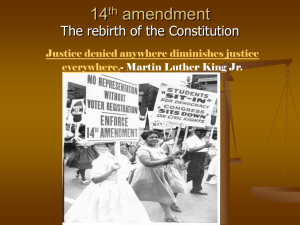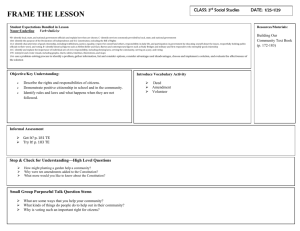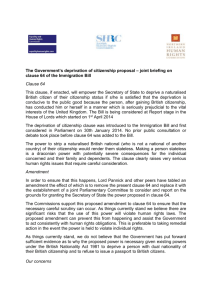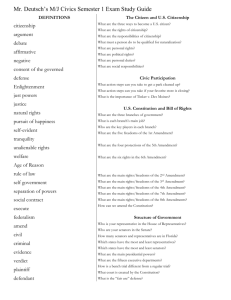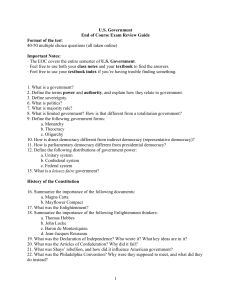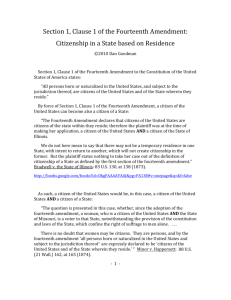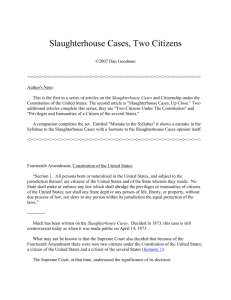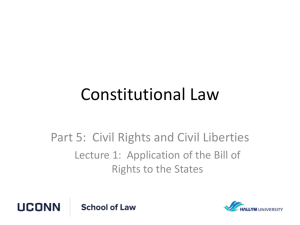Name Answer the following questions What is citizenship? A person
advertisement
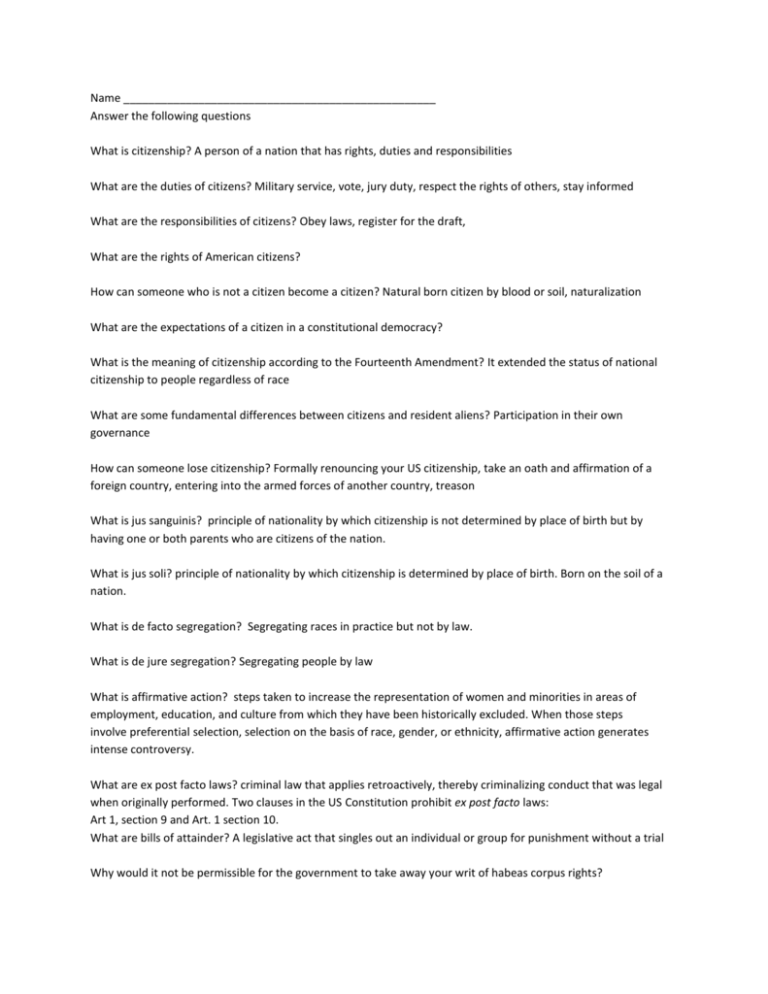
Name __________________________________________________ Answer the following questions What is citizenship? A person of a nation that has rights, duties and responsibilities What are the duties of citizens? Military service, vote, jury duty, respect the rights of others, stay informed What are the responsibilities of citizens? Obey laws, register for the draft, What are the rights of American citizens? How can someone who is not a citizen become a citizen? Natural born citizen by blood or soil, naturalization What are the expectations of a citizen in a constitutional democracy? What is the meaning of citizenship according to the Fourteenth Amendment? It extended the status of national citizenship to people regardless of race What are some fundamental differences between citizens and resident aliens? Participation in their own governance How can someone lose citizenship? Formally renouncing your US citizenship, take an oath and affirmation of a foreign country, entering into the armed forces of another country, treason What is jus sanguinis? principle of nationality by which citizenship is not determined by place of birth but by having one or both parents who are citizens of the nation. What is jus soli? principle of nationality by which citizenship is determined by place of birth. Born on the soil of a nation. What is de facto segregation? Segregating races in practice but not by law. What is de jure segregation? Segregating people by law What is affirmative action? steps taken to increase the representation of women and minorities in areas of employment, education, and culture from which they have been historically excluded. When those steps involve preferential selection, selection on the basis of race, gender, or ethnicity, affirmative action generates intense controversy. What are ex post facto laws? criminal law that applies retroactively, thereby criminalizing conduct that was legal when originally performed. Two clauses in the US Constitution prohibit ex post facto laws: Art 1, section 9 and Art. 1 section 10. What are bills of attainder? A legislative act that singles out an individual or group for punishment without a trial Why would it not be permissible for the government to take away your writ of habeas corpus rights? A writ of habeas corpus is used to bring a prisoner or other detainee before the court to determine if the person's imprisonment or detention is lawful. The separate but equal doctrine was upheld by the Supreme Court which promoted laws requiring racial segregation. What part of the Constitution did such laws violate? Equal protection clause of the 14th Amendment What does the takings clause of the Constitution protect? Fifth Amendment of the Constitution, private property may not be taken for public use withput just compensation. What is meant by equal protection of the laws? The Equal Protection clause means "no state shall deny to any person within its jurisdiction the equal protection of the laws". It supports the "all men are created equal" clause of the Declaration of Independence. What were the purposes of Black Codes in Southern states? To limit the newly won freedoms of African Americans How did the Dred Scott case help provoke the Civil War? Following the ruling Congress could not prohibit slavery in the territories. Explain the following clauses of the Constitution: "privileges and immunities" clause- Article 4- forbids a state from unjustly depriving citizens from other states of any rights derived from state citizenship solely on the basis of non-residence. "free exercise" clause- 1st Amendment reserves the right of American citizens to accept any religious belief and engage in religious rituals. It protects religious beliefs and actions made on behalf of those beliefs and allows for violation of laws, as long as that violation is made for religious reasons. "necessary and proper" clause- Article 1, Section 8, Clause 18: Also known as the "elastic clause," It allows the Government of the United States to "make all laws which shall be necessary and proper for carrying into execution the foregoing powers, and all other powers vested by this constitution." "full faith and credit" clause: provides that the states must recognize legislative acts, public records, and judicial decisions of the other states within the United States How did the Slaughter House Cases define the difference between US citizens and state citizens? the Supreme Court held that Louisiana’s granting of a semi-monopoly in the slaughterhouse industry to one company was not a violation of the Fourteenth Amendment’s guarantee that “ no State shall make or enforce any law which shall abridge the privileges or immunities of citizens of the United States.” The Court gave their understanding of the Fourteenth Amendment’s ratification, reasoning that the privileges or immunities clause is not “a protection to the citizen of a State against the legislative power of his own state” and that to argue otherwise is to rely on an incorrect assumption “that the citizenship of citizens of the United States and those of the several States, and the privileges and immunities guaranteed by the clause are the same.” What are suspect classes? Any class of individuals that have been historically subject to discrimination. What did the Civil Rights Act of 1964 do? Outlawed discrimination in public places, called for the desegregation of schools and public facilities and outlawed employment discrimination. What did the Voting Rights Act of 1965 do? Outlawed any barriers to voting, grandfather clause, literacy tests What was a white primary? A legal device once used by some Southern states to prevent African Americans from exercising their right to vote. The white primary was an effective device because of the virtual one-party political system in the South that existed until the late 1960s. In all but a few areas nomination by the Democratic Party was equivalent to being elected, with Republicans often not bothering to run in the general elections. In order to keep African Americans out of the political process, the Democratic Party in many states adopted a rule excluding them from party membership. The state legislatures worked in concert with the party, closing the primaries to everyone except party members What is racial gerrymandering? The practice that attempts to establish a political advantage for a particular party or group by manipulating district boundaries to create partisan advantaged districts. What was a poll tax? The act of making a group of people pay money in order to have the right to vote. Made illegal by the 24th Amendment. What are the levels of scrutiny? Strict, intermediate, rational basis. Strict is for suspect classes: The government must show that the challenged classification serves a compelling state interest and the classification is necessary to serve that interest. race, national origin, religion, aliens Intermediate: The government must show that the challenged classification serves an important state interest and that the classification is at least substantially related to serving that interest. gender, illegitimacy Rational basis: The government need only show that the challenged classification is rationally related to serving a legitimate state interest. all other classifications What is strict scrutiny? answered Cases: look these up. Plessy v. Ferguson Brown v. Board of Education U of California v. Bakke Richmond v. Croson Adarand Constructors Inc. v Pena Metro Broadcasting v. FCC Hopewood v. Texas?
